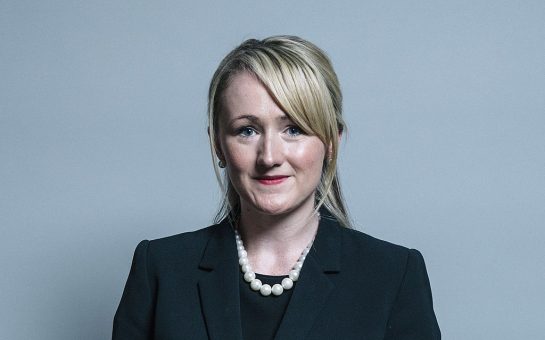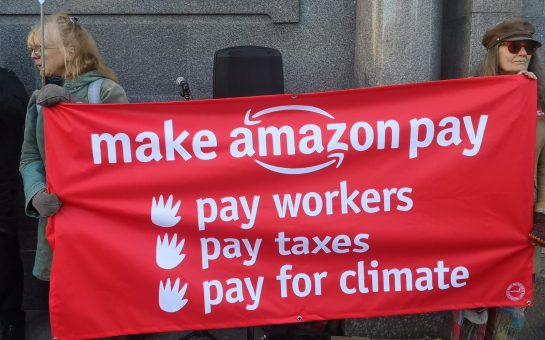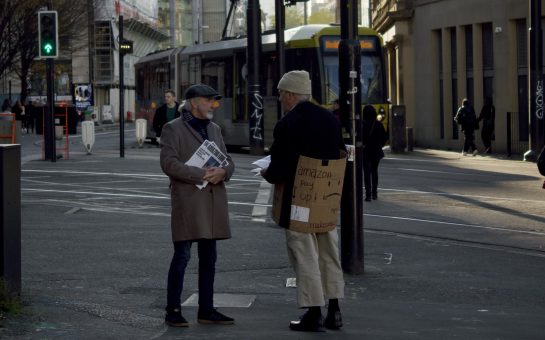The People’s History Museum’s new exhibition, Represent! Voices 100 Years On, launched last week as activists gathered on stage to recreate an infamous photo taken of suffragettes gathering before the Black Friday protest in 1910.
Programme officer Helen Antrobus who curated the new exhibition told MM that she wants people to feel uncomfortable, inspired and, above all else, empowered when they visit Represent.
“Even though perhaps you’re a bit sad that there still is change to be made,” she said. “I want people to realise that they’re the person who can make that.”
The exhibition tells the stories of those who campaigned for better representation and asks how far we have come since 1918 when the Representation of the People Act gave the vote to all men and some women in Britain.
Although it takes place on the centenary of the some women gaining the vote, Antrobus said that the museum did not want this to simply be an exhibition about the suffragette movement.
Antrobus explained that the process of putting the exhibition together, which she said was the best bit, involved using the museum’s contacts and engaging with communities to get as many voices involved as possible.
“We wanted to have suffrage running through the exhibition,” she said. “We really wanted it to be the thread that held the whole thing together.
“But we really wanted to marry the two timelines and show what’s happening today and what was happening then and how they differ, but also how they’re very similar.”
Antrobus welcomed guests at the launch with a rousing speech about the importance of many voices standing together behind one cause, to which she received a standing ovation from those on stage.
Standing ovation on stage for Programme Director Helen Antrobus who curated the #represent exhibition at the @PHMMcr which launches tonight #BlackFriday1910 pic.twitter.com/mMBNbsx6W2
— Joseph Timan (@josephtiman) June 1, 2018
Among those taking part in the photo on stage were Dr. Helen Pankhurst, MP Rebecca Long-Bailey and Manchester Lord Mayor June Hitchen who joined a number of women who continue fighting for equality and representation from groups like Sisters Uncut, Safety4Sisters and Girl Gang Manchester.
Speaking to MM, Dr. Helen Pankhurst, whose great grandmother Emmeline and grandmother Sylvia were both suffragette leaders, said that they would have been happy to see so many dynamic people involved in the movement today, but would be frustrated with the rate of change.
“I think that they’d be saying: ‘Come on, it’s been 100 years!” she said.
Pankhurst, an international development and women’s rights activist, also said that her ancestors might have recognised the spirit of the Me Too and Time’s Up campaigns and urge the women’s movement to use that opportunity.
“It is the conversation piece at the moment,” she said. “Everyone’s talking about gender relations. There’s a reconfiguration of what it is to be a woman, what it is to be a man, what those relationships should look like.
“Now is a moment to really grasp hold of that and not let it slip again.”
Also joining those on stage was Sally Lindsay, former Coronation Street actress and presenter of ‘Emmeline Pankhurst: The Making of a Militant’, a new documentary due to be aired on BBC North West this Friday at 7:30pm.
‘A LONG WAY TO GO’
Asked how far we’ve come in the last century, the TV star shared her annoyance at interviewers always asking her how she juggles having children with her acting career, a question that her husband Steve White, a well-established drummer, has never been asked.
Lord Mayor of Manchester June Hitchen, a microelectronic control engineer by trade, told MM that she finds such questions very insulting.
“It’s about who we are as a person that defines us,” Hitchen said. “And I do think we have a long way to go.”
Rebecca Long-Bailey, MP for Salford and Eccles told MM that if she was born 100 years earlier, she would never have become an MP or a solicitor and would have probably been working at a mill in Salford.
She pointed to the fact that recent years of austerity have disproportionately affected women, with one report claiming that as much as 86% of government cuts have fallen on the shoulders of women.
The Salford MP and Manchester City Councillor played up to the rivalry between the two cities but both agreed that communities are at the heart of the social movements that emerged from the region over the ages.
“Salford, and Manchester to some extent, were the birthplace of socialism and radicalism and that’s not going to change,” Long-Bailey said. “And I think a lot of that is intrinsically within us as communities and our culture.”
Represent! Voices 100 Years On is now open at the People’s History Museum until February 3 2019.



